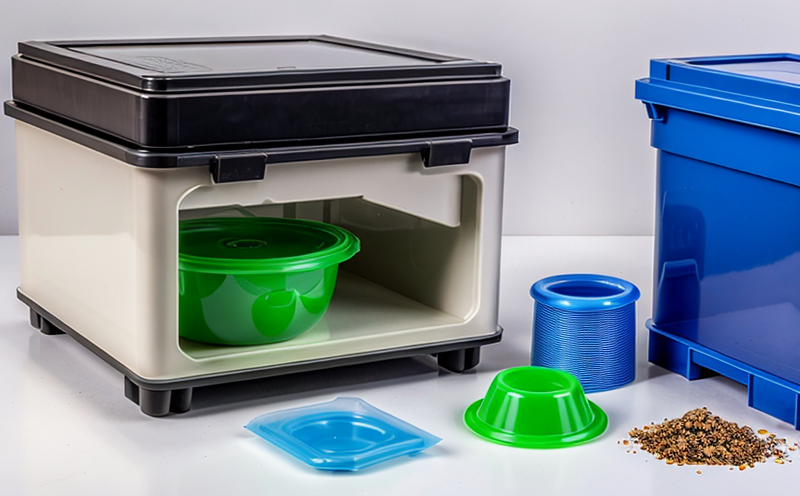ASTM D1898 Plastics Packaging Drop and Shock Resistance Testing
The ASTM D1898 standard is a crucial method used to evaluate the drop resistance of plastic packaging materials. This test simulates real-world conditions where packaging may be subjected to impacts during transport or handling, ensuring that the package can protect its contents under these stressors.
This testing protocol is particularly relevant for quality managers and compliance officers who need to ensure their products meet regulatory standards while also maintaining high-quality performance. For R&D engineers, this test provides valuable data on material properties and potential improvements. Procurement teams benefit from this information to source materials that are robust enough to perform in demanding environments.
The ASTM D1898 testing procedure involves placing the specimen on a rigid surface and subjecting it to free fall impacts from different heights. The standard specifies four impact points (front, back, top, bottom) and requires at least three specimens for each test condition. After impact, the integrity of the package is inspected for any deformations or ruptures.
The specimen preparation is critical in ensuring accurate results. Typically, packaging samples should be conditioned to a specific temperature and humidity level prior to testing according to ASTM D1898 requirements. This ensures that the material properties are stable before undergoing stress tests.
Instrumentation used for this test includes drop towers or impact testers designed specifically for compliance with ASTM standards. These devices provide precise control over fall heights, angles, and other variables critical to replicating real-world conditions accurately.
The acceptance criteria outlined in ASTM D1898 specify that no damage should occur to the packaging during the specified impacts. Any sign of deformation or failure indicates that further investigation into material selection or design may be necessary.
| Parameter | Description |
|---|---|
| Test Specimens | Typically rectangular or square, depending on the type of packaging being evaluated. |
| Fall Heights | Varies based on material and expected use case; generally from 1 to 2 meters. |
| Impact Points | Front, back, top, bottom - tested at least three times each under standard conditions. |
| Environmental Conditions | Conditioning of samples to specified temperature and humidity levels before testing. |
The results from ASTM D1898 tests are vital for manufacturers, retailers, and logistics companies alike. They help ensure that packages can withstand the rigors of shipping without compromising product integrity or safety. By adhering to these standards, businesses demonstrate their commitment to quality control and customer satisfaction.
Industry Applications
- Packaging manufacturers seeking to improve the durability of their products
- Retailers looking for cost-effective yet reliable packaging solutions
- Logistics companies aiming to reduce damage during transportation
- Regulatory bodies ensuring compliance with international standards
| Industry | Description of Application |
|---|---|
| Packaging | Evaluating the robustness of plastic containers used for food products. |
| Retail | Selecting appropriate packaging materials that balance cost and protection needs. |
| Logistics | Determining whether current packaging methods meet shipping requirements effectively. |
| Regulatory | Ensuring compliance with national and international packaging regulations. |
The ASTM D1898 test is widely used across various industries, particularly in sectors where product integrity during transportation or handling is paramount. By ensuring that packaging meets the stringent requirements set forth by this standard, companies can enhance customer satisfaction and build trust with their customers.
Eurolab Advantages
At Eurolab, we pride ourselves on delivering accurate, reliable results that meet the highest industry standards. Our state-of-the-art facilities and experienced technical staff ensure consistent quality across all tests.
- Compliance with ASTM D1898 - Ensuring precise adherence to test protocols for accurate results.
- Precision instrumentation - Using high-quality equipment tailored specifically for this type of testing.
- Accurate specimen preparation - Guaranteeing that samples are conditioned correctly before being subjected to impact tests.
- Comprehensive reporting - Providing detailed reports outlining the results of each test conducted.
We understand the importance of meeting deadlines and delivering accurate results. Our efficient processes allow us to provide timely feedback, ensuring minimal disruption to your operations while still maintaining rigorous standards.
Why Choose This Test
The ASTM D1898 test offers several advantages over other methods for assessing the drop resistance of plastic packaging. Firstly, it provides a standardized approach that ensures consistency and comparability between different laboratories.
- Standardized protocol - Ensures consistent results across multiple labs.
- Regulatory compliance - Helps manufacturers meet local and international regulations related to packaging safety.
- Cost-effective - By identifying weak points early in the development process, companies can avoid costly rework later on.
- Customer satisfaction - Providing robust packaging that protects products during transit enhances overall customer experience.
In summary, choosing ASTM D1898 ensures that your company is taking a proactive approach to maintaining high-quality standards. It provides valuable insights into material performance and helps identify areas for improvement in both existing designs and new innovations.





